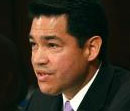| The federal Office of Special Counsel is investigating whether the Bush administration's firing of David Iglesias, U.S. Attorney for the District of New Mexico and a captain in the Navy Reserve, is a violation of the Uniformed Services Employment and Reemployment Rights Act. Iglesias is one of the eight U.S. attorneys fired by the Bush administration in what has become a widening scandal for the Justice Department and Attorney General Alberto Gonzalez. In an interview, Iglesias said he was given no reason for his firing when he was notified Dec. 7. But he later found out from a Senate staff member that Deputy Attorney General Paul McNulty had said Iglesias and six of the other seven were fired for performance reasons. And in Iglesias' case, a document released by the Justice Department referred to him as an "absentee landlord." But Iglesias said his absences from his civilian job were taken to fulfill his military obligations as a reservist. As a drilling reservist, he said, he is required to do 36 days of duty each year, and probably did a little extra, 40 to 45 days total for each year that he served as the U.S. Attorney for the District of New Mexico. Each time before he left for military duty, he notified the Washington, D.C., Justice Department office, which is the clearinghouse for such matters, he said. And his Navy Reserve information was on his résumé when he was hired for the U.S. Attorney's job in October 2001. Iglesias confirmed that he has authorized an investigation into whether his firing might constitute a violation of USERRA. A spokesman for the Office of Special Counsel confirmed that the office is investigating the case but declined to provide further details. The office, which often investigates employment and re-employment rights cases on behalf of military reservists, is an independent agency and is not connected to the Justice Department. If his firing is even partly related to his reserve duty, it could be a violation of the law. Iglesias said he has had a number of Guard or Reserve members working for him and had six who were mobilized since Sept. 11, 2001. As part of his reserve duties, he also has conducted training for virtually every drilling Navy reserve attorney. The subject of USERRA is "something near and dear to my heart," he said. He is scheduled to conduct training soon with Navy Reserve attorneys about how the Justice Department enforces USERRA with private employers. If his status as a reservist did, in fact, have anything to do with his firing as U.S. Attorney, he said, "it would be a violation of federal law — and I'd be horribly disappointed with the Justice Department tasked with enforcing it, that they would not honor the letter of the law with one of their own people. "There are so many ironies in this scandal," Iglesias said. "I've authorized the OSC to look into whether there is an issue. There may be. The stories keep changing from the Department of Justice." Performance evaluations and statements by officials indicated Iglesias' job performance was excellent, according to congressional testimony. In a joint statement when four of the fired attorneys were subpoenaed to testify before the House and Senate judiciary committees March 6, the attorneys, who are political appointees, said they were aware that they served at the pleasure of the president and could be removed for any or no reason. Iglesias' situation is more complicated than the USERRA issue. He testified about phone calls he received before the November 2006 midterm elections from Sen. Pete Domenici, R-N.M., and Rep. Heather Wilson, R-N.M., and as a result felt pressured related to a corruption investigation involving Democrats in New Mexico. Later, he testified, "I just started to put the dots together" in connection with his firing. As such, the OSC investigation into Iglesias' firing is moving on three parallel tracks: the Justice Department's violation of Iglesias' rights under the Whistleblower Protection Act and USERRA, and the government's violation of the Hatch Act, which restricts partisan political activity by government employees. |





